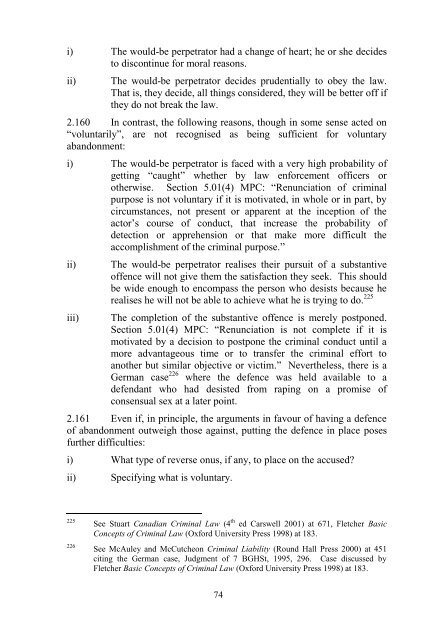Consultation Paper on Inchoate Offences - Law Reform Commission
Consultation Paper on Inchoate Offences - Law Reform Commission
Consultation Paper on Inchoate Offences - Law Reform Commission
Create successful ePaper yourself
Turn your PDF publications into a flip-book with our unique Google optimized e-Paper software.
i) The would-be perpetrator had a change of heart; he or she decidesto disc<strong>on</strong>tinue for moral reas<strong>on</strong>s.ii)The would-be perpetrator decides prudentially to obey the law.That is, they decide, all things c<strong>on</strong>sidered, they will be better off ifthey do not break the law.2.160 In c<strong>on</strong>trast, the following reas<strong>on</strong>s, though in some sense acted <strong>on</strong>“voluntarily”, are not recognised as being sufficient for voluntaryaband<strong>on</strong>ment:i) The would-be perpetrator is faced with a very high probability ofgetting “caught” whether by law enforcement officers orotherwise. Secti<strong>on</strong> 5.01(4) MPC: “Renunciati<strong>on</strong> of criminalpurpose is not voluntary if it is motivated, in whole or in part, bycircumstances, not present or apparent at the incepti<strong>on</strong> of theactor‟s course of c<strong>on</strong>duct, that increase the probability ofdetecti<strong>on</strong> or apprehensi<strong>on</strong> or that make more difficult theaccomplishment of the criminal purpose.”ii)iii)The would-be perpetrator realises their pursuit of a substantiveoffence will not give them the satisfacti<strong>on</strong> they seek. This shouldbe wide enough to encompass the pers<strong>on</strong> who desists because herealises he will not be able to achieve what he is trying to do. 225The completi<strong>on</strong> of the substantive offence is merely postp<strong>on</strong>ed.Secti<strong>on</strong> 5.01(4) MPC: “Renunciati<strong>on</strong> is not complete if it ismotivated by a decisi<strong>on</strong> to postp<strong>on</strong>e the criminal c<strong>on</strong>duct until amore advantageous time or to transfer the criminal effort toanother but similar objective or victim.” Nevertheless, there is aGerman case 226 where the defence was held available to adefendant who had desisted from raping <strong>on</strong> a promise ofc<strong>on</strong>sensual sex at a later point.2.161 Even if, in principle, the arguments in favour of having a defenceof aband<strong>on</strong>ment outweigh those against, putting the defence in place posesfurther difficulties:i) What type of reverse <strong>on</strong>us, if any, to place <strong>on</strong> the accused?ii)Specifying what is voluntary.225226See Stuart Canadian Criminal <strong>Law</strong> (4 th ed Carswell 2001) at 671, Fletcher BasicC<strong>on</strong>cepts of Criminal <strong>Law</strong> (Oxford University Press 1998) at 183.See McAuley and McCutche<strong>on</strong> Criminal Liability (Round Hall Press 2000) at 451citing the German case, Judgment of 7 BGHSt, 1995, 296. Case discussed byFletcher Basic C<strong>on</strong>cepts of Criminal <strong>Law</strong> (Oxford University Press 1998) at 183.74
















